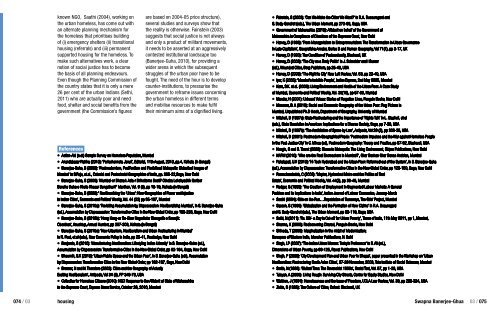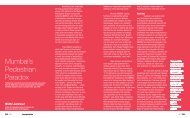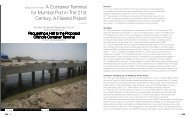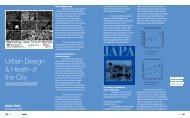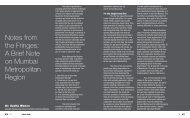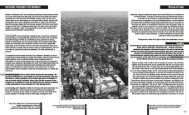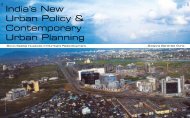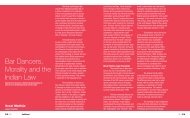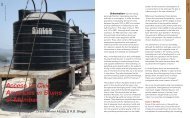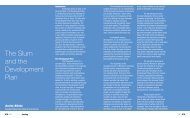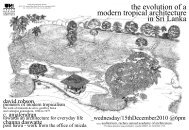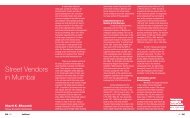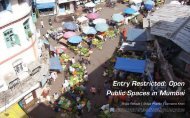Homeless in Neoliberal Cities: View from Mumbai - Urban Design ...
Homeless in Neoliberal Cities: View from Mumbai - Urban Design ...
Homeless in Neoliberal Cities: View from Mumbai - Urban Design ...
Create successful ePaper yourself
Turn your PDF publications into a flip-book with our unique Google optimized e-Paper software.
known NGO, Saathi (2004), work<strong>in</strong>g on<br />
the urban homeless, has come out with<br />
an alternate plann<strong>in</strong>g mechanism for<br />
the homeless that prioritises build<strong>in</strong>g<br />
of (i) emergency shelters (ii) transitional<br />
hous<strong>in</strong>g (referrals) and (iii) permanent<br />
supported hous<strong>in</strong>g for the homeless. To<br />
make such alternatives work, a clear<br />
notion of social justice has to become<br />
the basis of all plann<strong>in</strong>g endeavours.<br />
Even though the Plann<strong>in</strong>g Commission of<br />
the country states that it is only a mere<br />
26 per cent of the urban Indians (Sethi,<br />
2011) who are actually poor and need<br />
food, shelter and social benefits <strong>from</strong> the<br />
government (the Commission’s figures<br />
are based on 2004-05 price structure),<br />
several studies and surveys show that<br />
the reality is otherwise. Fa<strong>in</strong>ste<strong>in</strong> (2003)<br />
suggests that social justice is not always<br />
and only a product of militant movements,<br />
it needs to be asserted at an aggressively<br />
contested <strong>in</strong>stitutional landscape too<br />
(Banerjee-Guha, 2010), for provid<strong>in</strong>g a<br />
wider arena <strong>in</strong> which the subsequent<br />
struggles of the urban poor have to be<br />
fought. The need of the hour is to develop<br />
counter-<strong>in</strong>stitutions, to pressurise the<br />
government to reframe issues concern<strong>in</strong>g<br />
the urban homeless <strong>in</strong> different terms<br />
and mobilise resources to make fulfil<br />
their m<strong>in</strong>imum aims of a dignified liv<strong>in</strong>g.<br />
References<br />
• Action-Aid (n.d.) Sample Survey on <strong>Homeless</strong> Population, <strong>Mumbai</strong><br />
• Anandabazar Patrika (2010): ‘Poricchonnota Joruri’, Editorial, 11th August, 2010, pp.4, Kolkata (<strong>in</strong> Bengali)<br />
• Banerjee-Guha, S (2006): ‘Postmodernism, PostFordism and Flexibilised Metropolis: Dialectical Images of<br />
<strong>Mumbai</strong>’ <strong>in</strong> S.Raju, et.al., Colonial and Postcolonial Geographies of India, pp. 205-22,Sage, New Delhi<br />
• Banerjee-Guha, S (2008): ‘<strong>Mumbai</strong>-er Dharavi: Asia-r Brihottomo Bosti Othoba Lokshyadhik Goriber<br />
Benche thaka o Khete Khaoar Songsthan’ Manthan, Vol. 9 (6), pp 16-19, Kolkata (<strong>in</strong> Bengali)<br />
• Banerjee-Guha, S (2009):’ <strong>Neoliberal</strong>is<strong>in</strong>g the ‘<strong>Urban</strong>’: New Geographies of Power and Injustice<br />
<strong>in</strong> Indian <strong>Cities</strong>’, Economic and Political Weekly, Vol. 44 (22) pp 95-107, <strong>Mumbai</strong><br />
• Banerjee-Guha, S (2010a): ‘Revisit<strong>in</strong>g Accumulation by Dispossession: <strong>Neoliberal</strong>is<strong>in</strong>g <strong>Mumbai</strong>’, <strong>in</strong> S. Banerjee-Guha<br />
(ed.), Accumulation by Dispossession: Transformative <strong>Cities</strong> <strong>in</strong> the New Global Order, pp 198-226, Sage, New Delhi<br />
• Banerjee-Guha, S (2010b): ‘Hong Kong-er Be-Ghor Nagorikder Bhougolik o Samajik<br />
Obosthan’, Anushtup, Annual Number, pp 287-303, Kolkata (<strong>in</strong> Bengali)<br />
• Banerjee-Guha, S (2010c): ‘New <strong>Urban</strong>ism, <strong>Neoliberal</strong>ism and <strong>Urban</strong> Restructur<strong>in</strong>g <strong>in</strong> <strong>Mumbai</strong>’<br />
<strong>in</strong> R. Peet, et.al (eds.), New Economic Policy <strong>in</strong> India, pp 25-41, Routledge, New Delhi<br />
• Benjam<strong>in</strong>, S (2010): ‘Manufactur<strong>in</strong>g <strong>Neoliberal</strong>ism: Lifestyl<strong>in</strong>g Indian <strong>Urban</strong>ity’ <strong>in</strong> S. Banerjee-Guha (ed.),<br />
Accumulation by Dispossession: Transformative <strong>Cities</strong> <strong>in</strong> the New Global Order, pp 92-194, Sage, New Delhi<br />
• Bhowmik, S.K (2010): ‘<strong>Urban</strong> Public Space and the <strong>Urban</strong> Poor’, <strong>in</strong> S. Banerjee-Guha (ed.), Accumulation<br />
by Dispossession: Transformative <strong>Cities</strong> <strong>in</strong> the New Global Order, pp 182-197, Sage, New Delhi<br />
• Brenner, N and N. Theodore (2002): <strong>Cities</strong> and the Geography of Actually<br />
Excit<strong>in</strong>g <strong>Neoliberal</strong>ism’, Antipode, Vol 34 (3), PP 349-79, USA<br />
• Collective for <strong>Homeless</strong> Citizens (2010): NGO Response to the Affidavit of State of Maharashtra<br />
to the Supreme Court, Express News Service, October 26, 2010, <strong>Mumbai</strong><br />
• Fa<strong>in</strong>ste<strong>in</strong>, S (2003): ‘Can We Make the <strong>Cities</strong> We Want’ <strong>in</strong> R.A. Bueauregard and<br />
S. Body-Gendrot (eds.), The <strong>Urban</strong> Moment, pp 273-86, Sage, USA<br />
• Government of Maharashtra (2010): Affidavit on behalf of the Government of<br />
Maharashtra <strong>in</strong> Compliance of Directions of the Supreme Court, New Delhi<br />
• Harvey, D (1989): ‘From Managerialism to Entrepreneurialism: The Transformation <strong>in</strong> <strong>Urban</strong> Governance<br />
<strong>in</strong> Late Capitalism’, Geografiska Annaler, Series B and Human Geography, Vol 71(1), pp 3-17, UK<br />
• Harvey, D (1990): The Condition of Postmodernity, Blackwell, UK<br />
• Harvey, D (2003): ‘The City as a Body Politic’ <strong>in</strong> J. Schneider and I Susser<br />
(ed.), Wounded <strong>Cities</strong>, Berg Publishers, pp 25-46, USA<br />
• Harvey, D (2008): ‘The Right to City’ New Left Review, Vol. 53, pp 23-40, USA<br />
• Iyer, K (2005): ‘<strong>Mumbai</strong>’s Invisible People’, Indian Express, 2nd May 2005, <strong>Mumbai</strong><br />
• Karn, S.K. et al. (2003): Liv<strong>in</strong>g Environment and Health of the <strong>Urban</strong> Poor: A Case Study<br />
of <strong>Mumbai</strong>, Economic and Political Weekly, Vol. 38(19), pp 57-66, <strong>Mumbai</strong><br />
• Mander, H (2001): Unheard Voices: Stories of Forgotten Lives, Pengu<strong>in</strong> Books, New Delhi<br />
• Menezes, B. A (2010): Social and Economic Geography of the <strong>Urban</strong> Poor: Rag Pickers <strong>in</strong><br />
<strong>Mumbai</strong>, Unpublished Ph.D thesis, Department of Geography, University of <strong>Mumbai</strong><br />
• Mitchell, D (1997a): State Restructur<strong>in</strong>g and the Importance of ‘Rights Talk’ <strong>in</strong> L. Staeheli, et al<br />
(eds.), State Devolution <strong>in</strong> American: Implications for a Diverse Society, Sage, pp 7-38, USA<br />
• Mitchell, D (1997b): ‘The Annihilation of Space by Law’, Antipode, Vol 29 (2), pp 303-35, USA<br />
• Mitchell, D (2001): Postmodern Geographical Praxis: ‘Postmodern Impulses and the War aga<strong>in</strong>st <strong>Homeless</strong> People<br />
<strong>in</strong> the Post Justice City’ <strong>in</strong> C. M<strong>in</strong>ca (ed), Postmodern Geography: Theory and Practice, pp 57-92, Blackwell, USA<br />
• Nangia, S and S. Thorat (2000): Slums <strong>in</strong> Metropolis: The Liv<strong>in</strong>g Environment, Shipra Publications, New Delhi<br />
• NAPM (2010): ‘Who are the Real Encroachers <strong>in</strong> <strong>Mumbai</strong>’, Ghar Bachao Ghar Banao Andolan, <strong>Mumbai</strong><br />
• Pakalapati, U.V (2010): ‘Hi-Tech Hyderabad and the <strong>Urban</strong> Poor: Reformed out of the System’, <strong>in</strong> S. Banerjee-Guha<br />
(ed.), Accumulation by Dispossession: Transformative <strong>Cities</strong> <strong>in</strong> the New Global Order, pp 125-150, Sage, New Delhi<br />
• Ramachandraiah, C (2009): ‘Maytas, Hyderabad Metro and the Politics of Real<br />
Estate’, Economic and Political Weekly, Vol. 44(3), pp 36-40, <strong>Mumbai</strong><br />
• Rodger, G (1993): ‘The Creation of Employment <strong>in</strong> Segmented Labour Markets: A General<br />
Problem and its Implications <strong>in</strong> India’, Indian Journal of Labour Economics, January-March<br />
• Saathi (2004): Girls on the Run…Repatriation of Runaways, The Girls’ Project, <strong>Mumbai</strong><br />
• Sassen, S (1999): ‘Globalization and the Formation of New Claims’ <strong>in</strong> R.A. Beauregard<br />
and S. Body-Gendrot (eds.), The <strong>Urban</strong> Moment, pp 99-118, Sage, USA<br />
• Sethi, N (2011): ‘Rs. 20/- a Day is Cut-off for <strong>Urban</strong> Poverty’, Times of India, 11th May 2011, pp 1, <strong>Mumbai</strong>,<br />
• Sharma, K (2000): Rediscover<strong>in</strong>g Dharavi, Pengu<strong>in</strong> Books, New Delhi<br />
• Sh<strong>in</strong>oda, T (2005): Marg<strong>in</strong>alization <strong>in</strong> the midst of Modernisation;<br />
Sweepers of Western India, Manohar Publications, N. Delhi<br />
• S<strong>in</strong>gh, I.P (2007): ‘The Indian <strong>Urban</strong> Morass: Today’s Preference’ <strong>in</strong> S. Ali (ed.),<br />
Dimensions of <strong>Urban</strong> Poverty, pp 98-125, Rawat Publications, New Delhi<br />
• S<strong>in</strong>gh, P (2008): ‘City Development Plan and <strong>Urban</strong> Poor <strong>in</strong> Bhopal’, paper presented <strong>in</strong> the Workshop on ‘<strong>Urban</strong><br />
<strong>Neoliberal</strong>ism: Restructur<strong>in</strong>g South Asian <strong>Cities</strong>’, 27-28 November, 2008, Tata Institute of Social Sciences, <strong>Mumbai</strong><br />
• Smith, N (1998): ‘Giuliani Time: The Revanchist 1990s’, Social Text, Vol. 57, pp 1-20, USA<br />
• Tulsyan, A (2008): Liv<strong>in</strong>g Rough: Surviv<strong>in</strong>g City Streets, Centre for Equity Studies, New Delhi<br />
• Waldron, J (1991): <strong>Homeless</strong>ness and the Issue of Freedom, UCLA Law Review, Vol. 39, pp 295-324, USA<br />
• Zuk<strong>in</strong>, S (1995): The Culture of <strong>Cities</strong>, Oxford: Blackwell, UK<br />
074 / 03 hous<strong>in</strong>g<br />
Swapna Banerjee-Ghua 03 / 075


